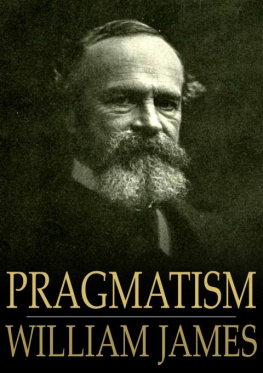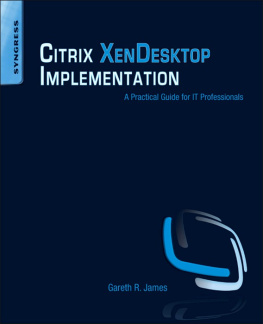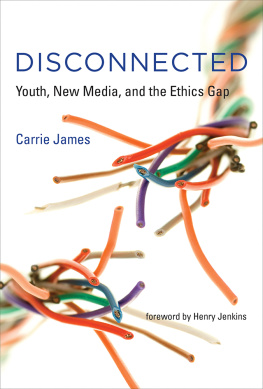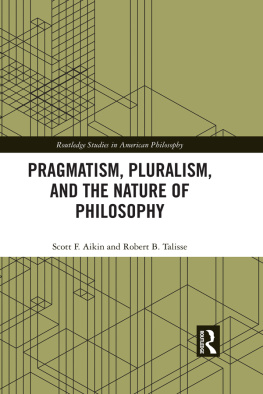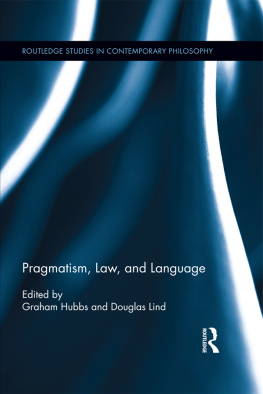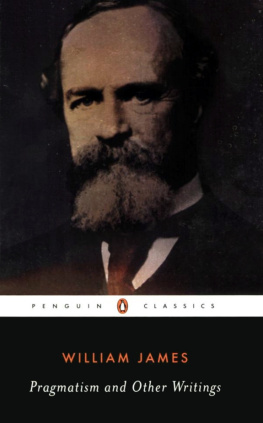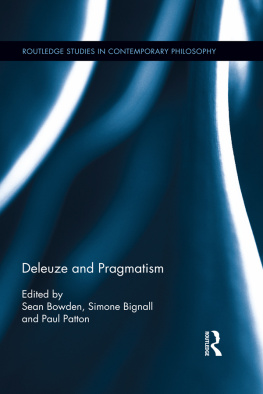James - Pragmatism
Here you can read online James - Pragmatism full text of the book (entire story) in english for free. Download pdf and epub, get meaning, cover and reviews about this ebook. year: 2010, publisher: The Floating Press, genre: Science. Description of the work, (preface) as well as reviews are available. Best literature library LitArk.com created for fans of good reading and offers a wide selection of genres:
Romance novel
Science fiction
Adventure
Detective
Science
History
Home and family
Prose
Art
Politics
Computer
Non-fiction
Religion
Business
Children
Humor
Choose a favorite category and find really read worthwhile books. Enjoy immersion in the world of imagination, feel the emotions of the characters or learn something new for yourself, make an fascinating discovery.
Pragmatism: summary, description and annotation
We offer to read an annotation, description, summary or preface (depends on what the author of the book "Pragmatism" wrote himself). If you haven't found the necessary information about the book — write in the comments, we will try to find it.
James: author's other books
Who wrote Pragmatism? Find out the surname, the name of the author of the book and a list of all author's works by series.
Pragmatism — read online for free the complete book (whole text) full work
Below is the text of the book, divided by pages. System saving the place of the last page read, allows you to conveniently read the book "Pragmatism" online for free, without having to search again every time where you left off. Put a bookmark, and you can go to the page where you finished reading at any time.
Font size:
Interval:
Bookmark:

Pragmatism
A New Name for Some Old Ways of Thinking
First published in 1907
ISBN 978-1-775417-77-4
2010 The Floating Press
While every effort has been used to ensure the accuracy and reliability of the information contained in The Floating Press edition of this book, The Floating Press does not assume liability or responsibility for any errors or omissions in this book. The Floating Press does not accept responsibility for loss suffered as a result of reliance upon the accuracy or currency of information contained in this book. Do not use while operating a motor vehicle or heavy equipment. Many suitcases look alike.
Visit www.thefloatingpress.com
To the Memory of John Stuart Mill
from whom I first learned the pragmatic openness of mind and whom myfancy likes to picture as our leader were he alive to-day.
The lectures that follow were delivered at the Lowell Institute inBoston in November and December, 1906, and in January, 1907, atColumbia University, in New York. They are printed as delivered,without developments or notes. The pragmatic movement, so-calledIdo not like the name, but apparently it is too late to change itseems to have rather suddenly precipitated itself out of the air. Anumber of tendencies that have always existed in philosophy have allat once become conscious of themselves collectively, and of theircombined mission; and this has occurred in so many countries, andfrom so many different points of view, that much unconcertedstatement has resulted. I have sought to unify the picture as itpresents itself to my own eyes, dealing in broad strokes, andavoiding minute controversy. Much futile controversy might have beenavoided, I believe, if our critics had been willing to wait until wegot our message fairly out.
If my lectures interest any reader in the general subject, he willdoubtless wish to read farther. I therefore give him a fewreferences.
In America, John Dewey's 'Studies in Logical Theory' are thefoundation. Read also by Dewey the articles in the PhilosophicalReview, vol. xv, pp. 113 and 465, in Mind, vol. xv, p. 293, and inthe Journal of Philosophy, vol. iv, p. 197.
Probably the best statements to begin with however, are F. C. S.Schiller's in his 'Studies in Humanism,' especially the essaysnumbered i, v, vi, vii, xviii and xix. His previous essays and ingeneral the polemic literature of the subject are fully referred toin his footnotes.
Furthermore, see G. Milhaud: le Rationnel, 1898, and the finearticles by Le Roy in the Revue de Metaphysique, vols. 7, 8 and 9.Also articles by Blondel and de Sailly in the Annales de PhilosophieChretienne, 4me Serie, vols. 2 and 3. Papini announces a book onPragmatism, in the French language, to be published very soon.
To avoid one misunderstanding at least, let me say that there is nological connexion between pragmatism, as I understand it, and adoctrine which I have recently set forth as 'radical empiricism.'The latter stands on its own feet. One may entirely reject it andstill be a pragmatist.
Harvard University, April, 1907.
In the preface to that admirable collection of essays of his called'Heretics,' Mr. Chesterton writes these words: "There are somepeopleand I am one of themwho think that the most practical andimportant thing about a man is still his view of the universe. Wethink that for a landlady considering a lodger, it is important toknow his income, but still more important to know his philosophy. Wethink that for a general about to fight an enemy, it is important toknow the enemy's numbers, but still more important to know theenemy's philosophy. We think the question is not whether the theoryof the cosmos affects matters, but whether, in the long run,anything else affects them."
I think with Mr. Chesterton in this matter. I know that you, ladiesand gentlemen, have a philosophy, each and all of you, and that themost interesting and important thing about you is the way in whichit determines the perspective in your several worlds. You know thesame of me. And yet I confess to a certain tremor at the audacity ofthe enterprise which I am about to begin. For the philosophy whichis so important in each of us is not a technical matter; it is ourmore or less dumb sense of what life honestly and deeply means. Itis only partly got from books; it is our individual way of justseeing and feeling the total push and pressure of the cosmos. I haveno right to assume that many of you are students of the cosmos inthe class-room sense, yet here I stand desirous of interesting youin a philosophy which to no small extent has to be technicallytreated. I wish to fill you with sympathy with a contemporaneoustendency in which I profoundly believe, and yet I have to talk likea professor to you who are not students. Whatever universe aprofessor believes in must at any rate be a universe that lendsitself to lengthy discourse. A universe definable in two sentencesis something for which the professorial intellect has no use. Nofaith in anything of that cheap kind! I have heard friends andcolleagues try to popularize philosophy in this very hall, but theysoon grew dry, and then technical, and the results were onlypartially encouraging. So my enterprise is a bold one. The founderof pragmatism himself recently gave a course of lectures at theLowell Institute with that very word in its title-flashes ofbrilliant light relieved against Cimmerian darkness! None of us, Ifancy, understood ALL that he saidyet here I stand, making a verysimilar venture.
I risk it because the very lectures I speak of DREWthey broughtgood audiences. There is, it must be confessed, a curiousfascination in hearing deep things talked about, even tho neither wenor the disputants understand them. We get the problematic thrill,we feel the presence of the vastness. Let a controversy begin in asmoking-room anywhere, about free-will or God's omniscience, or goodand evil, and see how everyone in the place pricks up his ears.Philosophy's results concern us all most vitally, and philosophy'squeerest arguments tickle agreeably our sense of subtlety andingenuity.
Believing in philosophy myself devoutly, and believing also that akind of new dawn is breaking upon us philosophers, I feel impelled,per fas aut nefas, to try to impart to you some news of thesituation.
Philosophy is at once the most sublime and the most trivial of humanpursuits. It works in the minutest crannies and it opens out thewidest vistas. It 'bakes no bread,' as has been said, but it caninspire our souls with courage; and repugnant as its manners, itsdoubting and challenging, its quibbling and dialectics, often are tocommon people, no one of us can get along without the far-flashingbeams of light it sends over the world's perspectives. Theseilluminations at least, and the contrast-effects of darkness andmystery that accompany them, give to what it says an interest thatis much more than professional.
The history of philosophy is to a great extent that of a certainclash of human temperaments. Undignified as such a treatment mayseem to some of my colleagues, I shall have to take account of thisclash and explain a good many of the divergencies of philosophers byit. Of whatever temperament a professional philosopher is, he trieswhen philosophizing to sink the fact of his temperament. Temperamentis no conventionally recognized reason, so he urges impersonalreasons only for his conclusions. Yet his temperament really giveshim a stronger bias than any of his more strictly objectivepremises. It loads the evidence for him one way or the other, makingfor a more sentimental or a more hard-hearted view of the universe,just as this fact or that principle would. He trusts histemperament. Wanting a universe that suits it, he believes in anyrepresentation of the universe that does suit it. He feels men ofopposite temper to be out of key with the world's character, and inhis heart considers them incompetent and 'not in it,' in thephilosophic business, even tho they may far excel him in dialecticalability.
Font size:
Interval:
Bookmark:
Similar books «Pragmatism»
Look at similar books to Pragmatism. We have selected literature similar in name and meaning in the hope of providing readers with more options to find new, interesting, not yet read works.
Discussion, reviews of the book Pragmatism and just readers' own opinions. Leave your comments, write what you think about the work, its meaning or the main characters. Specify what exactly you liked and what you didn't like, and why you think so.

